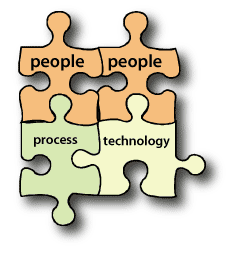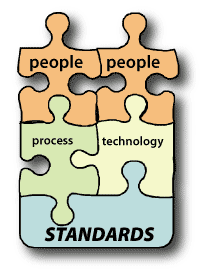 |
 |
 |
| Home | More Articles | Join as a Member! | Post Your Job - Free! | All Translation Agencies |
|
|||||||
|
|
Globalization: People, Process and Technology

People are not just an item on the checklist. People (like language) are a fundamental dimension of the problem space. Both processes and technology must be defined with people in mind. They must support the activities that information workers need to perform and generally make their lives easier and more efficient. People must remain on top and in control of their world; technology should be designed and perceived as a useful tool, not as a surrogate dictator. But nobody said building the global village would be easy. People, process and technology: one could say that about just any modern industry; why do we still feel the need to say it? Because our industry has been and still is more of a challenge: many people still don’t understand the value and complexity of globalization, many processes are still immature and technology adoption is still much less than it could be. Globalization practitioners must endure regular frustration and globalization managers must spend undue amounts of time as globalization evangelists. But nobody said building the global village would be easy; we are pioneers in a new land; it’s the Wild Wild West all over again, only this time it’s the Wild Wild World! (that’s what www really means). Along with the frustration, comes a lot of opportunity. Our industry is starting to mature. Nevertheless, our industry is starting to mature. What are the signs? Well, for one thing, more and more articles in the Globalization Insider are actual case studies of successful globalization projects. And outsourcing has arrived in force. Konstantin Josseliani, Founder and CEO of Integrated Language Solutions, discusses the latest developments (premium content) regarding the ways in which our industry is adapting and how localization models are changing as a result of more and more outsourcing.
An even more important sign of maturity for our industry—for any industry—is the creation and adoption of standards. Standards Are Surprisingly UsefulApplying J2450 has increased translation quality and decreased translation time and cost! Standards can benefit all of us, sometimes in surprising ways, as Don Sirena, Language Translation Manager for GM North America, shows in his article on the application of the J2450 language quality metric. Interestingly, he reports that translation quality has increased, and that translation time and cost have decreased! One reason for these surprising results is that a well-defined quality metric allows a more focused review activity that reports the errors the customer cares about, but does not report the errors the customer does not care about. So time and cost are saved while quality is increased. In fact, the J2450 review proved so efficient that, over time, it was possible to phase out all other types of review. That is the value of a language quality metric.
TMX is another standard that can be surprisingly useful. In his article, Shailendra Musale, Globalization Engineering Project Manager for Veritas India, suggests that translation memories stored in TMX format can be re-used for a variety of purposes. He reminds us that TMX is an extensible standard and that it is possible to add user-defined properties to translation units to identify the domain, the customer, the project, the type of string, etc. It is also possible to add free-form text as notes that can provide extra information for translators re-using a given translation. With extra information, TMX files can be used for a variety of purposes, from rendering a glossary to supporting multilingual search. TMX and XML:TM may have more in common than was previously suspected. A TMX file is a collection of multilingual segments. This is quite similar to the proposal of Andrzej Zydron, CTO of XML International, whose XML:TM namespace can transform any XML source document into an XML multilingual document. In Zydron’s own terms, the multilingual document is the TM. If I am allowed a slight extension of Shailendra's idea, I would say that with additional properties, the TMX TM can be the multilingual document(s). After all, several translation memory technologies maintain the document structure along with the segments. TMX and XML:TM may have more in common than was previously suspected…
The Technology That Standards BuiltStandards are the foundation upon which technology is built. From ASCII to Unicode, from HTML to XML, from TMX to J2450, standards are the foundation upon which technology is built. Standards allow more advanced technology to be developed by assembling standard components. The new, more advanced technology then requires new standards. This is how an information industry builds its conceptual edifice, layer by layer. Our industry is no different, it's just been a bit slow (the small number of major technology vendors in the GILT space is one indication). The good news, though, as I indicated in my last article on CMS (Content Management Systems) and GMS (Globalization Management Systems), is that things are starting to pick up. In fact, we have an interview with Savitha Varadan (premium content), Manager of Global Web Content for PeopleSoft, describing how her company precisely integrated a CMS – Interwoven TeamSite – with a GMS – SDL WorkFlow – to manage thousands of Web pages in 10 languages across 24 Web sites. An interesting case study of a successful globalization project.
Pushing the envelope even further, last month SDL released their new Knowledge-based Translation System (KbT System) which is a unique combination of Translation Memory with an adaptive Machine Translation engine. Human translations stored in the TM are used to train the MT engine, apparently generating substantial savings. In his interview with our chief editor, Mark Lancaster, President and CEO of SDL, discusses his vision (premium content) for combining the best of human effort, workflow and technology, and explains why he is so committed to industry standards, including TMX. He also introduces us to a few surprises along the way… “Believe it or not, SDL is not looking to make a business of selling translation technology.” The diagram below serves as today’s conclusion. It illustrates that process and technology are the key components of our industry. But let us never forget that they are enabled by standards, and that they serve the translators, the managers and the knowledge workers who make our industry what it is. 
Reprinted
by permission from the Globalization Insider,
11 May 2004, Volume XIII, Issue 2.2. Copyright the Localization Industry Standards Association (Globalization Insider: www.localization.org, LISA: www.lisa.org) and S.M.P. Marketing Sarl (SMP) 2004
E-mail this article to your colleague! Need more translation jobs? Click here! Translation agencies are welcome to register here - Free! Freelance translators are welcome to register here - Free! |
|
|
Legal Disclaimer Site Map |